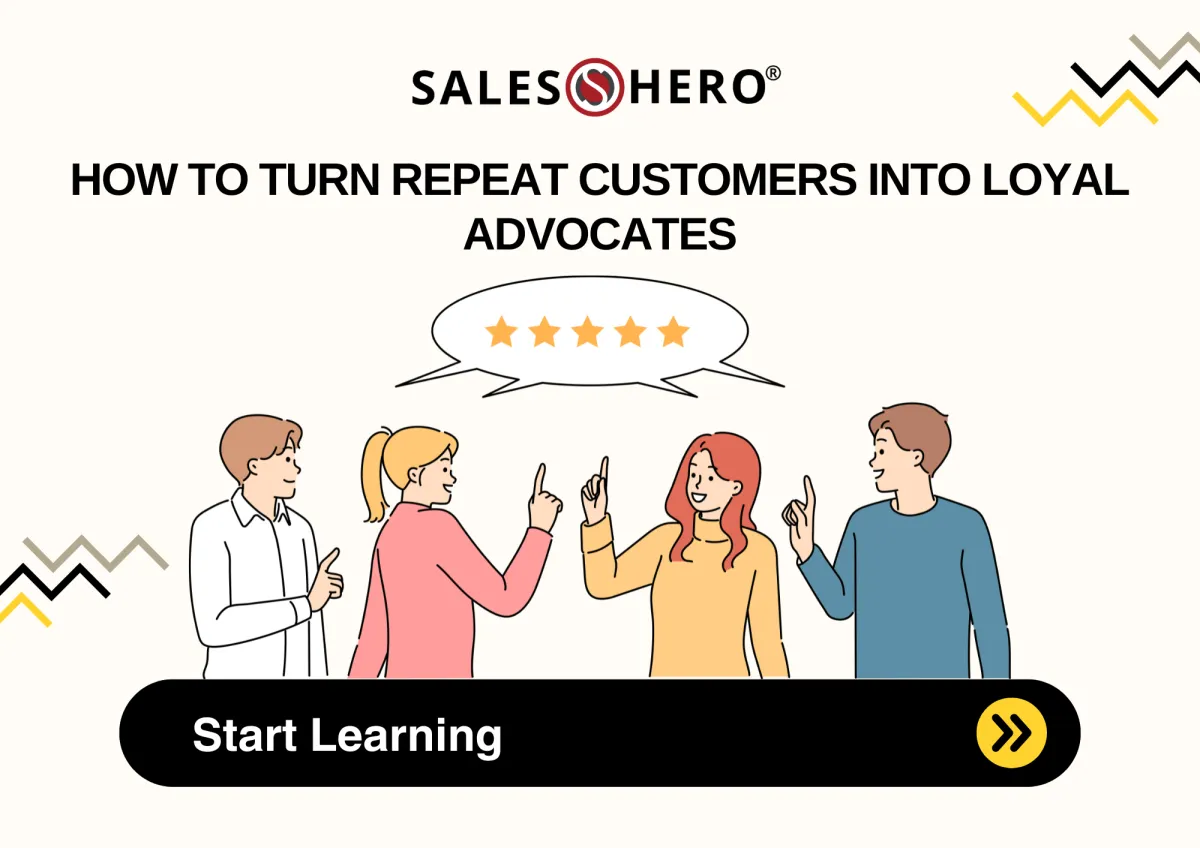
Author: Christopher Yip
Date Published: 28 May 2025
How to Turn Repeat Customers into Loyal Advocates
Customer loyalty has become one of the most powerful currencies in today’s highly competitive B2B and B2C markets. Having customers who buy from you repeatedly is great but turning those customers into loyal advocates is what will truly future-proof your business. Advocates don’t just buy from you; they promote your business, defend your brand, and attract new customers for free. But how do you make this leap from repeat buyer to passionate promoter?
Table of Contents
1. Understanding Customer Loyalty
2. Personalization: Make Customers Feel Known
3. Service Excellence: The Foundation of Loyalty
4. Build Community: Turn Customers Into Contributors
5. Reward Loyalty: Incentivize and Celebrate
6. Gather Feedback: Make Customers Feel Heard
7. Educate and Empower: Add Real Value
8. Track Loyalty Metrics: Measure and Optimize
9. Customer Advocacy Flywheel: How Momentum Builds Over Time
10. Final Thoughts: Advocate Creation Is a Long Game
Understanding Customer Loyalty
Loyalty is rarely built on price or product alone. It grows from consistent, positive experiences and an emotional connection between the customer and the brand. To turn repeat buyers into advocates, we first need to understand what makes a customer loyal.
• They feel valued and recognized
When customers believe that a brand knows and appreciates them, they are more likely to return. Personalized messages, loyalty perks, and attentive service show them they matter.
• They trust your brand deeply
Trust is built through reliability, consistency, and honesty. Every interaction is an opportunity to reinforce that trust.
• They connect emotionally with your brand
Emotional connections often stem from shared values, mission-driven branding, or positive interactions with staff. This bond goes beyond the product.
Personalization: Make Customers Feel Known
Personalization is more than just inserting someone’s name in an email, it's about delivering relevance. Customers today expect experiences tailored to their needs and preferences.
• Customize communications and offers
Use past purchase behavior to recommend new products or send personalized discounts. With tools like SalesHero, you can automate this process based on real-time customer data, ensuring the right offer reaches the right person at the right time.
• Segment your audience
Not every customer is the same. Segmenting based on buying behavior or industry helps deliver tailored experiences. Lets you build dynamic segments automatically as customers interact with your brand.
Service Excellence: The Foundation of Loyalty
Your customer service can either elevate or destroy the customer experience. Excellent service is one of the top reasons customers stay loyal. To create advocacy, service must be more than reactive, it must be proactive and empathetic.
• Offer fast and effective support
Quick responses to inquiries or complaints build confidence and reduce friction. Real-time alerts for pending follow-ups and provides a full interaction history for context.
• Train teams to solve problems with empathy
Support staff who show they care about solving issues create emotional goodwill, leading to positive word-of-mouth.
Build Community: Turn Customers Into Contributors
People want to belong. Creating a sense of community around your brand encourages customers to identify with your business. By offering spaces and opportunities for interaction, you invite deeper engagement.
• Create online or offline spaces for interaction
Forums, Facebook groups, or events where customers can share tips and connect with others deepen the brand relationship.
• Highlight customer stories and testimonials
Showcasing real users not only validates your product but also gives customers a sense of pride in being part of your brand journey. You can flag high-satisfaction customers and automatically request stories or reviews.
Reward Loyalty: Incentivize and Celebrate
Loyalty programs are not just about discounts, they are about recognition and motivation. When customers feel appreciated, they stick around and promote you.
• Implement tiered rewards or referral programs
Recognize and reward different levels of engagement to keep people moving forward in their journey with you. Referral tracking system lets you set up automatic rewards for successful referrals.
• Offer exclusive perks or early access
Giving loyal customers access to new products or limited deals makes them feel special and valued. Schedule these offers automatically by loyalty status or purchase frequency.
Gather Feedback: Make Customers Feel Heard
Your customers have insights that can help you improve. Asking for feedback and acting on it is a powerful way to build advocacy. Feedback mechanisms should be part of your regular communication strategy.
• Use surveys or feedback tools
Regularly gather opinions on products or services to learn what’s working and what’s not. Allows you to automate post-purchase surveys and Net Promoter Score (NPS) tracking.
• Show how feedback is implemented
When customers see their ideas come to life, they feel involved and respected.
Educate and Empower: Add Real Value
Empowered customers are more engaged and more likely to advocate for your product. Education builds confidence and trust. Providing meaningful knowledge strengthens your brand-customer relationship.
• Offer tips, demos, and learning resources
Help customers use your product better with tutorials, webinars, and FAQ content. Can distribute this content based on user journey stage.
• Support continuous value delivery
Don’t stop helping after the sale. Regular education keeps customers engaged and positions your brand as a helpful authority. Helps you schedule recurring knowledge-based emails tailored to each customer type.
Track Loyalty Metrics: Measure and Optimize
You can’t improve what you don’t measure. Use these KPIs to track loyalty-building success. Monitoring the right metrics helps identify what works and what doesn’t.
• Net Promoter Score (NPS)
A direct measure of advocacy how likely someone is to recommend you. Trigger this automatically after a certain number of purchases.
• Customer Lifetime Value (CLV)
Helps quantify the long-term revenue potential of a customer.
• Repeat Purchase Rate
Shows how often customers return, a strong indicator of loyalty.
• Referral Rate
Measures how often customers bring in others, revealing the effectiveness of word-of-mouth. Referral tracking tools give you instant insights here.
Customer Advocacy Flywheel: How Momentum Builds Over Time
Building loyalty and advocacy isn’t a one-time event—it’s a compounding process. The more advocates you have, the faster your business grows organically. Here’s how the flywheel works:
• Engagement → Loyalty
Great first experiences and personalized journeys turn one-time buyers into repeat customers. Ensures consistent engagement through follow-ups and product reminders.
• Loyalty → Advocacy
With every satisfied repeat purchase, customers move closer to advocacy. Automating rewards and recognizing milestones.
• Advocacy → New Leads
Advocates bring in referrals. Referral engine captures these leads and starts them on the same personalized journey—fueling the next cycle.
Final Thoughts: Advocate Creation Is a Long Game
Turning customers into advocates isn’t a one-time tactic. It’s a continuous process that requires listening, adapting, and delivering meaningful value.
Apply the principles and points discussed in this blog. Use tools to help scale these strategies with consistency and precision. Over time, you’ll not just increase customer retention, you’ll build a loyal community that fuels your growth from within.
Because your greatest marketing asset isn’t your budget or your product. It’s the voice of a happy, empowered customer.
FAQs
What’s the difference between a repeat customer and a loyal advocate?
A repeat customer buys from you more than once, often out of habit, price, or convenience. A loyal advocate not only continues buying but actively recommends your brand, defends it, and promotes it to others often voluntarily.
Why is advocacy more valuable than loyalty alone?
Advocacy is scalable word-of-mouth marketing. Advocates bring you new customers without added advertising spend. They also help reduce churn by reinforcing brand trust through peer validation.
I’m just starting out. Should I focus on advocacy now or later?
Start as early as possible. Even with a small customer base, implementing advocacy-focused strategies builds strong habits, improves retention, and fuels organic growth.





